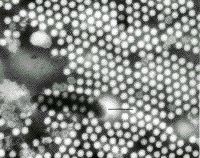|
Human Astroviruses 1-8 |
|
|
|
|
|
Astroviruses most likely enter through the apical surface of cells; however, in culture, the virus appears to enter through the basolateral surface. 8 different serotypes are capable of infecting humans. Serotype 1 appears to be the most prevalent, while serotype 4 appears to cause the most severe cases of gastroenteritis. Replication of the virus most likely occurs in the intestinal epithelial cells after infection. The virus incubates in these cells for about 3 to 4 days in adults before symptoms become apparent. In children, the incubation period can be as short as 24 hours. |
|
|
|
Astroviruses are a worldwide problem for humans, but young children often are the most frequently infected. Elderly patients and military recruits also have significantly high infection rates. However, normal, healthy adults rarely contract gastroenteritis from the virus; it takes large doses of infected food or water in order to cause disease. The virus appears to be a seasonal virus, as infections peak in the winter months in the temperate climates. In tropical climates, this correlates to the rainy season; this seasonal pattern is similar to the major viral cause of diarrhea, rotaviruses. The virus is primarily spread through the fecal-oral route, but nosocomial, or hospital-born, infections are also seen. |
|
|
|
Astrovirus is the second-leading cause of viral gastroenteritis amongst children. The virus causes a mild case of diarrhea that lasts for 2 to 3 days. Often, the diarrhea accompanies vomiting, fever, anorexia, and abdominal pain which usually last for less than 4 days. Even though the virus does cause loss of water through diarrhea and vomiting, the dehydration is not as severe as in rotavirus-caused gastroenteritis. Because of this, hospitalization is rarely needed. Some patients have become lactose intolerant after recovering from the virus. Antibodies are seen in children and the elderly who had developed disease; few antibodies are seen in healthy adults who have recovered from infection. |
|
|
|
While astrovirus gastroenteritis can be a serious disease, no special medications or treatments are required for the disease other than the use of oral rehydration salts to maintain water levels in affected children. Hygiene, especially in locations where transmission levels are high, serves as the most important barrier between humans and astrovirus infections. Strong concentrations of methanol, up to 90%, used to clean surfaces has proved to be the most effective method in sterilizing surfaces. Chlorination of drinking water also reduced the prevalence of astrovirus in the environment. A vaccine has not yet been designed, and will not be until researchers have a better understanding of astrovirus immunity.
|
